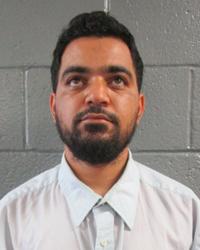A Tucson man who the FBI said showed undercover agents how to build remote-controlled bombs thought the intended target was going to be a Mexican drug trafficker attending a sports event in the United States, according to court documents filed this week.
The FBI accused Ahmad Suhad Ahmad, a 30-year-old naturalized U.S. citizen and Iraqi refugee, of building two explosive devices for undercover agents during an April 2017 sting operation in Tucson and Las Vegas.
Ahmad believed the devices would be used in a car bomb when an unnamed “ranking member” of a Mexican drug-trafficking organization “was going to be in the United States to attend a sporting event,” an FBI special agent wrote in a Nov. 1 amended complaint filed in U.S. District Court in Tucson.
Ahmad was arrested Oct. 26 in Tucson on suspicion of distributing information related to explosives, destructive devices and weapons of mass destruction, according to an Oct. 26 complaint. The amended complaint filed Nov. 1 added details to the allegations and included a federal charge for conspiring to sell 150 grams of heroin.
Ahmad remains in the custody of the U.S. Marshals while U.S. Magistrate Judge Eric J. Markovich considers arguments heard at a Friday hearing.
Federal prosecutor Kevin Hakala urged Markovich to keep Ahmad in custody until his trial, saying Ahmad threatened to kill an FBI source if anything happened to Ahmad’s family. Hakala also said Ahmad’s “extensive foreign familial ties” made him a flight risk and Ahmad previously violated his probation on drug-related state charges.
Assistant federal public defender Walter Goncalves said the bomb-making allegations against Ahmad were “serious,” but “there is absolutely no danger at all” if Ahmad were released.
Ahmad hasn’t used drugs in 18 months and underwent a “religious conversion” while in Arizona state prison for the drug-related conviction, Goncalves said. He was released four months early on Sept. 28 due to good behavior.
After his release, Ahmad went to a mosque regularly, prayed daily and started working as a mechanic in Tucson, Goncalves said.
Ahmad was arrested after FBI agents called him while he was driving from Phoenix with his children, Goncalves said. Agents said they wanted to talk to him and he agreed to meet them at his Tucson apartment, where they arrested him.
The federal government could have filed a notice with the state prison to have Ahmad placed in federal custody as soon as he was released, Goncalves said. The fact that no such notice was filed and Ahmad was released for a month “shows they don’t believe he’s a risk.”
If released, Ahmad would agree to a number of conditions, such as wearing an ankle monitor and taking drug tests, Goncalves said.
Hakala pointed to Ahmad “bragging” to an FBI source in December 2016 about bombs he could build easily, such as glass bottles and buckets filled with nails, screws and ball bearings.
Ahmad told an FBI source in Tucson he learned during the war in Iraq how to build bombs that could be detonated by cell phone, court records show. He then sent a text message with a “recipe” to make the bombs to an FBI source in Tucson and agreed to travel with FBI sources and two undercover agents to Las Vegas, where he built two bombs and showed agents how to make more bombs.
“FBI agents on scene maintained control of the explosive devices,” according to the Nov. 1 amended complaint. “The C-4 and blasting caps were inert items controlled by the FBI.”
Ahmad was born in Baghdad and lived there until he was 16 years old, when he and his family fled to Syria, according to a pre-sentence report in a 2016 Pima County Superior Court case in which Ahmad was convicted of solicitation to possess methamphetamine and possessing drug paraphernalia.
When he was 19 years old, the United Nations helped his family settle in Tucson as refugees, according to the pre-sentence report. Ahmad became a naturalized U.S. citizen in 2013.
Ahmad also is accused of selling 45 grams of heroin to FBI sources and trying to sell them another 100 grams. Federal prosecutors had asked the court to dismiss that charge in March.
Goncalves said the amount of heroin Ahmad allegedly sold to FBI sources was far smaller than the amounts frequently seen in federal court in Tucson.




